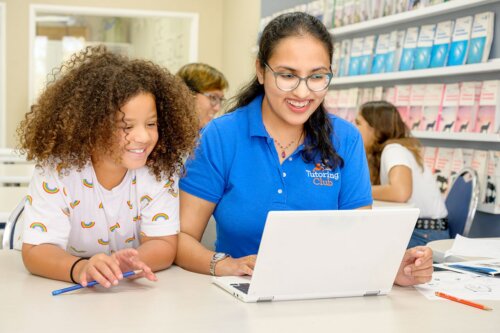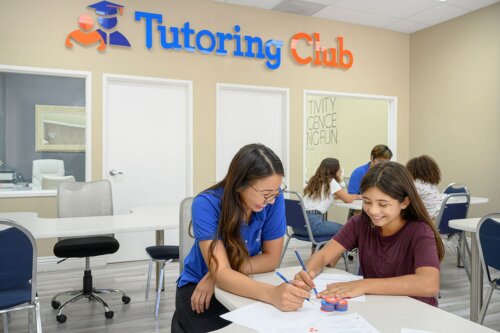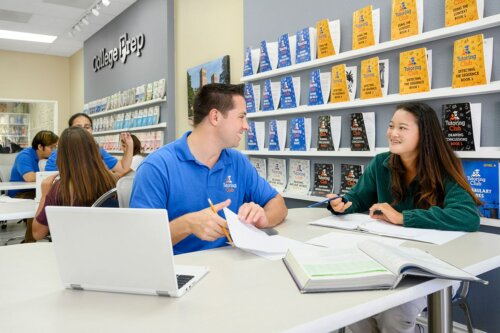How Tutoring Strengthens Grades and Student Confidence with a Learning Center in St Johns

A learning center provides one-on-one tutoring that identifies a child’s specific gaps and builds the skills they need to improve grades, study more efficiently, and feel confident in class.This guide shows how the customized one-on-one tutoring programs deliver measurable improvement in core subjects, spark interest, and create study habits that transfer back to school and learner success.
Parents will learn which subjects usually respond quickest to individualized help, practical test-prep tactics, and how Tutoring Club of Johns Creek’s local tutoring services ensure progress is reinforced effectively within our learning center with reading and writing tutors, math tutors, and other specialized instructors. We cover the St Johns County area in Florida, including Beachwalk, Silverleaf, and northern St Augustine.
We also cover approaches for neurodiverse learners, the advantages of individualized instruction versus classroom-only support, and clear criteria for choosing an effective, well-trained tutor. Read on for evidence-based explanations rooted in educational psychology and teaching practice, plus subject examples, study-skill checklists, and straightforward next steps to support your child—and learn how Tutoring Club of Johns Creek can help when you’re ready to schedule an assessment and a personalized plan to find tutors in your area.
Ready to Boost Your Child’s Academic Journey?
Discover how personalized tutoring can transform grades, confidence, and study habits. Schedule a no-risk assessment today on a complimentary call with our director to find tutors nearby!
How Does Tutoring Improve Academic Performance and Grades?

At Tutoring Club of Johns Creek, we improve academic performance by first diagnosing exactly where a learner is struggling through our proprietary national standardized assessments, then delivering focused instruction and scaffolded practice with a custom paper-based curriculum that layers skills to build a firm foundation.
Our diagnostic assessment reveals what is holding an individual back; specific lessons are paced to close those gaps, and regular progress checks ensure new learning shows up in their work.
This cycle—practice, feedback, remediation—shortens the time it takes to correct errors, raise test scores, and make homework more consistent. Most learners can complete 1 year of curriculum in reading, writing, or mathematics in less than 2 months. We make it easy to get children caught up and get ahead.
Research and meta-analyses support this approach, which explains why targeted tutoring often accelerates recovery faster than broad, one-size-fits-all remediation, especially when progress is measured and shared with families and teachers. The next section explains which subjects tend to improve most quickly and why subject-specific methods matter.
What Subjects See the Greatest Improvement Through Tutoring?

Math tutoring and reading tutoring typically show the fastest, most visible gains because both depend on sequential lessons that respond well to targeted, scaffolded practice.
At Tutoring Club of Johns Creek, our proprietary system uses the assessment to determine skill gaps (for example, number sense or fractions) and specific lessons at each grade level for the child to begin. Then our math tutors use our pre-test for that level to determine specific lessons to work on to rebuild understanding through step-by-step practice that moves from concrete examples to abstract problems. After completing each level, learners take a post-test to gauge mastery before moving on to the next level. Our Math Tutors use a proprietary teaching method called Chunked-Based Learning that increases children’s retention of mathematics by over 50%. This helps children retain what they are being taught and progress quickly in their math tutoring.
Reading Tutoring
In reading tutoring, guided fluency work, phonemic awareness, explicit reading comprehension tutoring strategies, fun and engaging vocabulary lessons, and multisensory lessons quickly improve accuracy and understanding. Our custom curriculum has 6 primary competencies for both comprehension and vocabulary. Our tutors teach learners each skill, and the individual is evaluated for mastery daily. To increase phonemic awareness, we work on various phonemes as well as sight words in different fun approaches. Our reading tutors are specifically trained to provide dyslexia tutoring and support children with reading challenges.
Math Tutoring
Our math tutors also provide homework help. This can range from elementary homework all the way through middle school and high school with Algebra, Geometry, AP Calculus, and more advanced topics.
Tutors are trained in the Socratic tutoring style, where learners explore what they know and are taught how to guide themselves to answers to be more self-directed and independent. The tutors teach study skills, time management, independence, and more.
Challenges per Subject
Different subjects bring distinct challenges—and tutoring targets each with clear techniques tied to concrete outcomes.
|
Subject
|
Typical Challenge
|
How Tutoring Helps / Measured Outcome
|
|---|---|---|
|
Math
|
Previous gaps and weak procedural fluency
|
Scaffolded practice and targeted remediation produce higher quiz and test scores and stronger mastery within months
|
|
Reading
|
Limited understanding of passages/ comprehension/vocabulary
|
Multisensory phonics and guided lessons to increase fluency, comprehension, vocabulary, and grade-level growth
|
|
Phonics
|
Decoding weaknesses and fluency
|
Multisensory phonics and guided lessons to increase fluency
|
How Does Tutoring Help with Test Preparation and Score Enhancement?
Tutoring Club of Johns Creek’s test preparation programs boost test performance by combining a focused review of content gaps, timed practice, and test-taking strategies tailored to the exam format. We support the following tests: FAST, SAT, ACT, ASVAB, PERT, and other K-12 based schools‘ tests. Tutors use practice items to reveal weak areas, teach prioritization and pacing techniques, and rehearse timed conditions so learners gain familiarity and reduce surprises. Beyond content, instructors teach metacognitive habits—how to check answers, allocate time across sections, and limit careless mistakes—which often lead to measurable score gains after several focused sessions. For both standardized tests and school exams, the mix of diagnostics, targeted practice, and timely feedback builds calibrated confidence and higher scores.
The next section looks at how tutoring supports the confidence and motivation that sustain these gains.
How Does Tutoring Build Confidence and Motivation?
Tutoring builds confidence by creating frequent mastery experiences, giving specific, strength-focused feedback, and setting reachable goals so progress is visible for children who attend brick-and-mortar schools or homeschooling. Small wins on scaffolded tasks reinforce a child’s belief that they can learn; consistent, precise praise shifts attention to strategy and effort rather than fixed ability. Regular goal-setting and check-ins make progress tangible, which increases motivation and reduces avoidance. When learners feel competent in one-on-one sessions, that self-efficacy carries over to class participation and homework persistence, creating a positive cycle of effort and success. The next subsection lists common tutor strategies for boosting self-esteem and how they vary by age.
What Strategies Do Tutors Use to Boost Self-Esteem in Learners?
Tutoring Club of Johns Creek’s expert tutors are specifically trained to use scaffolded tasks, strength-based feedback, and bite-sized goals to create repeated success experiences that build self-esteem. For elementary children, tutors rely on concrete rewards and simple progress charts to mark mastery of phonics or arithmetic facts. Middle and high school learners receive strategy coaching—how to break large assignments into manageable parts, approach complex problems, and reflect on small gains—which empowers them to tackle harder material. Tutors also weave a child’s interests into lessons and use language that credits strategy and effort, reducing learned helplessness and supporting lasting engagement.
With those self-esteem strategies in mind, the next subsection explains how tutoring reduces academic anxiety and helps learners develop a genuine interest in learning through predictable routines and meaningful connections.
How Can Tutoring Reduce Academic Anxiety and Foster a Love for Learning?
Tutoring lowers anxiety by creating a predictable session structure, practicing simple stress-management techniques, and gradually exposing learners to test-like conditions in a supportive setting. A typical session begins with a quick check-in, moves to focused practice, and ends with a positive summary—reducing uncertainty and making progress feel achievable, including rewarding the learner for effort with our engaging token system. paired with shopping at our student store. For many of our younger children, this positive atmosphere allows them to feel safe and enjoy attending sessions.
Many learners look forward to shopping at the store for items like pencils, stuffed animals, and other cool items that keep them motivated. To spark intrinsic interest, they connect topics to a child’s hobbies or real-world problems, turning abstract tasks into meaningful challenges. These methods transform anxious avoidance into confident engagement, improving homework habits and long-term resilience.
What Essential Study Skills Are Developed Through Tutoring?
Tutoring teaches practical study skills—time management, organization, active note-taking, and critical thinking—that improve school performance and homework efficiency right away. Tutors model planners, help prioritize to-do lists, and break tasks into manageable steps to prevent procrastination and make long-term projects doable. Evidence-based techniques such as retrieval practice, self-quizzing, and spaced review are woven into sessions so learners learn how to study effectively rather than just re-read material. These transferable lessons reduce test anxiety, boost retention, and foster academic independence, providing individuals with reliable methods for tackling tough assignments. The following sections outline time-management frameworks and note-taking and reasoning strategies.
Many sessions include a compact table linking study skills to tutoring methods and real-world outcomes that empower learners.
|
Study Skill
|
Tutoring Method
|
Practical Outcome / Example
|
|---|---|---|
|
Time management
|
Weekly planners and task breakdowns
|
Projects finish earlier and last-minute cramming drops
|
|
Note-taking
|
Cornell notes and concept mapping
|
Clear, reviewable notes that improve recall on tests
|
|
Active recall
|
Self-quizzing and spaced practice
|
Stronger long-term retention and better test performance
|
How Does Tutoring Teach Effective Time Management and Organization?
Tutors teach time management with prioritized task lists, focused work blocks, and weekly planning that aligns with school deadlines so learners spread effort evenly. A common method is a two-step planner: list tasks by due date, then assign 25–40 minute focus blocks with short breaks to sustain attention and reduce overwhelm. Tutors show how to break big projects into milestones and use checklists for each step, which improves completion rates and cuts procrastination. Parents can support this by briefly reviewing weekly plans and celebrating milestone wins. These organizational lessons usually translate quickly into steadier homework habits and more predictable study routines.
In What Ways Does Tutoring Enhance Critical Thinking and Note-Taking?
Tutors develop critical thinking by modeling question-generation, evidence-based reasoning, and synthesis across sources so learners move from memorizing to analyzing. For notes, tutors introduce structured formats—like Cornell notes and visual maps—that make review faster and more effective, turning notes into study tools rather than transcripts. Tutors use think-aloud strategies to demonstrate how to deconstruct problems and build arguments step by step, giving individuals reusable frameworks. Practical exercises—such as converting lecture notes into test questions—reinforce the lessons and improve performance on assessments that require synthesis and reasoning.
Tutor-Facilitated Executive Control Activities Enhance Mathematical Problem-Solving Across tutoring sessions, instructors encouraged executive-control activities—such as revising and evaluating—that support competent mathematical problem solving and deeper understanding. This approach aligns with research on metacognition and academic achievement.
What Are the Advantages of Personalized One-on-One Tutoring in a Learning Center?

Tutoring Club of Johns Creek’s one-on-one tutoring model adapts instruction to each child’s pace, learning styles, and curriculum needs—delivering focused interventions that a classroom can’t always provide or an individual private tutor. With individualized attention, tutors correct misunderstandings instantly, adjust pacing in real time, and use a custom curriculum that matches the learner’s level—reducing wasted time and speeding mastery. Personalized tutoring also offers flexible scheduling and goal-setting that align with assessments and family routines to maximize impact. The combination of adaptive instruction, timely feedback, and progress monitoring makes one-on-one work especially effective for children who need targeted remediation or enrichment beyond a school‘s pacing. The next section explains how personalization maps to instructional elements and benefits.
How Does Tailored Instruction Adapt to Different Learning Styles?
At Tutoring Club of Johns Creek, tailored instruction begins with our comprehensive diagnostic assessment to determine whether a child learns best through visual, auditory, kinesthetic, or mixed approaches, then adapts materials accordingly. Visual learners get diagrams and concept maps; auditory learners benefit from clear verbal explanations and read-alouds; kinesthetic learners use manipulatives and hands-on activities. Tutors often combine modalities—such as multisensory interventions—to strengthen weaker channels and create redundancy that supports memory. These adjustments speed comprehension and reduce frustration because teaching matches how the individual processes information. The table below links personalization elements to what they change and the benefits that follow.
|
Personalization Element
|
What It Adapts
|
Benefit to Learner
|
|---|---|---|
|
Diagnostic assessment
|
Skill gaps and misconceptions
|
More precise instruction and faster remediation
|
|
Adaptive pacing
|
Learning speed and mastery thresholds
|
Reduces boredom and prevents overload
|
|
Modality adjustments
|
Preferred sensory channels
|
Boosts engagement and strengthens retention, personalized learning
|
Why Is Individualized Attention Key to Academic Success?
Extensive educational research shows that frequent, focused feedback and targeted practice yield significantly larger gains than passive classroom exposure—especially when progress is tracked with data. One-on-one instruction increases time-on-task with high-quality practice and prevents gaps from compounding, producing steady gains in grades and confidence. That’s why individualized tutoring can accelerate learning and build long-term academic resilience.
How Can Tutoring Help Overcome Common K-12 Challenges?
Tutoring Club of Johns Creek addresses common K–12 challenges—such as attention issues, decoding difficulties, and weak retention—by combining diagnostic assessment, targeted interventions, and smart practice schedules, all delivered by our trained specialists. For children with ADHD, tutoring emphasizes executive-function coaching, consistent routines, and task scaffolding to improve focus and follow-through. For children with dyslexia, multisensory structured literacy programs use explicit and systematic phonics programs and sequential practice to strengthen decoding, encoding, and comprehension. For general gaps, tutors use spaced retrieval and cumulative review to turn short-term gains into lasting knowledge. These targeted supports let tutors close gaps efficiently and adapt as progress data emerges, so learners return to school work with greater independence. The next section highlights the specific supports parents should look for when choosing a tutor for neurodiverse learners.
What Tutoring Support Is Available for Learners with Dyslexia and ADHD?
Tutoring Club of Johns Creek offers specialized programs with tutors trained in multisensory, structured literacy approaches for dyslexia—including explicit phonics, sequential decoding drills, and guided fluency practice—to build decoding automaticity and comprehension. For ADHD, our tutors emphasize executive-function coaching: predictable routines, simple task-initiation strategies, and short, focused work intervals to build sustained attention and follow-through. Both approaches rely on regular progress monitoring and clear parent-Director communication, informed by daily tutor notes, so strategies can be reinforced at home and adjusted over time. Parents should seek tutors trained in structured literacy for dyslexia and those who explicitly teach executive-function strategies for ADHD.
How Does Tutoring Address Academic Learning Gaps and Improve Retention?
Tutoring closes these gaps with a clear four-step cycle: assess → target → practice → track. Diagnostic assessments reveal specific deficits; targeted lessons close those gaps with scaffolded practice; spaced retrieval moves knowledge into long-term memory; and tracking metrics show when concepts are stable enough to return to classroom work. Tutors also use cumulative review and interleaving to prevent forgetting and strengthen retrieval pathways, improving performance on cumulative tests and year-end assessments. This systematic approach helps short-term gains become durable learning that positively affects a learner’s academic path.
The Research-Backed Impact of High-Quality Tutoring
The effectiveness of personalized tutoring is well supported by decades of educational research and meta-analyses. Studies across grade levels and subjects show that well-structured, individualized tutoring can produce substantial academic gains—often exceeding results from classroom instruction alone.
-
Significant Effect Sizes: Meta-analyses, such as Bloom (1984) and more recent reviews, report that one-on-one tutoring can move a learner from the 50th percentile toward the 70th or even higher, depending on intervention intensity and quality. That can translate into months or years of accelerated progress.
-
Targeted Intervention: Research emphasizes the importance of diagnostic assessment to identify precise gaps. Addressing these deficits with tailored instruction prevents gaps from compounding, which supports long-term retention and mastery.
-
Enhanced Motivation and Self-Efficacy: Beyond scores, studies in educational psychology show that frequent success experiences and specific, positive feedback in tutoring boost confidence, reduce academic anxiety, and promote a growth mindset—key ingredients for sustained engagement.
-
Development of Transferable Study Skills: Teaching evidence-based strategies—like retrieval practice, spaced repetition, and effective note-taking—is a hallmark of effective tutoring. Learners who master these metacognitive skills not only perform better in current classes but also gain lifelong habits.
These findings explain why educators and researchers recommend high-quality, individualized tutoring as a powerful tool for academic acceleration and support.
Why Use Tutoring Club of Johns Creek?

Choosing The Tutoring Club of Johns Creek (St Johns, FL) means investing in a proven path to academic excellence and lasting confidence for your child. For over three decades, The Tutoring Club Franchise has specialized in personalized, one-on-one instruction with diagnostic-driven lessons, flexible pacing, and individualized accountability that produce measurable progress and renewed effort, and tailored to each child’s unique needs, ensuring measurable progress.
We see sustained effort through our:
-
Individualized Learning Plans: Every learner begins with a comprehensive diagnostic assessment, leading to a customized plan that targets specific gaps and leverages strengths.
-
Expert Tutors: Our team comprises experienced subject specialists and patient mentors dedicated to providing consistent support, positive reinforcement, and practical, evidence-based strategies.
-
Comprehensive Support: From foundational support to advanced test preparation and executive-function coaching, we cover a wide range of subjects and essential study skills.
-
Proven Results: We track progress meticulously, celebrate every milestone, and partner with families to ensure academic success translates into real-world confidence and resilience.
At Tutoring Club of Johns Creek, we don’t just improve grades; we empower learners to become independent, confident learners ready to tackle any academic challenge. Discover the difference personalized attention can make.
Ready to See Your Child Thrive?
Schedule a professional assessment today and unlock a personalized learning plan designed for success.
Why Should Parents Choose a Learning Center for Their Child’s Academic Success?
Private tutoring done in a learning center delivers immediate academic support and lasting benefits—better study habits, higher confidence, and more effective learning routines—that classroom instruction alone may not provide. Families who choose private tutoring done with a learning center get diagnostic-driven lessons, flexible pacing, and individualized accountability that produce measurable progress and renewed interest, along with a controlled environment. Choosing the right tutoring option means verifying the learning center’s qualifications, tutor training, and consistent use of progress metrics.
Many parents weigh the long-term benefits when deciding on tutoring; the next section summarizes proven outcomes and common trajectories seen in current research.
What Are the Proven Long-Term Impacts of Tutoring on Learner Achievement in a Learning Center?
Research shows that high-quality tutoring, delivered consistently and guided by diagnostics, can produce months of additional learning—equivalent to accelerated progress—improving immediate test scores as well as long-term retention and course choices. Sustained tutoring that emphasizes study skills and metacognitive strategies often leads to smarter course selection, greater confidence in STEM subjects, and better preparation for advanced work. These long-term effects come from addressing core skill deficits and teaching learners how to learn, not just what to learn. The final section offers concrete actions parents can take to maximize these benefits and explains how to move from observation to scheduling an assessment with Tutoring Club of Johns Creek.
How Can Parents Support Their Child’s Tutoring Journey Effectively?
Parents play a crucial role in supporting their child’s tutoring journey, primarily through open communication with our center and fostering a positive learning environment. We understand that for many families, especially those with older learners (3rd grade and above), academic work at home can lead to increased stress for both parent and child. Our program is designed to provide comprehensive support within the center, minimizing the need for parents to take on additional responsibilities at home.
Additionally, for our younger children (2nd grade and below), we offer optional, engaging activities like worksheets and stories. These allow parents to read with their child and observe their progress firsthand, fostering a shared love for learning without pressure.
Regardless of age, parents can maximize the benefits of tutoring by:
-
Communicate with the Director: Stay in regular contact with the Director for updates on goals and progress, informed by daily tutor notes.
-
Foster a Supportive Environment: Provide a quiet workspace for homework and encourage a positive attitude towards learning.
-
Celebrate Progress: Acknowledge and celebrate your child’s milestones and efforts, reinforcing their motivation and self-efficacy.
-
For Younger Children (2nd Grade & Below): Engage with optional at-home worksheets or stories provided by the center to reinforce learning and observe progress.
If you’d like a professional assessment and a tailored plan, reach out to Tutoring Club of Johns Creek to discuss next steps and schedule an initial evaluation.
About the Author

Kimberly Mullins is a dedicated educator and parent who knows firsthand how transformational the right support can be. After her own daughter faced learning challenges—including dyslexia and dysgraphia—Kim became passionate about helping other students overcome academic struggles. Today, she leads two award-winning Tutoring Club locations in St. Johns County, where thousands of students have boosted skills, grades, and confidence under her guidance.


Comments